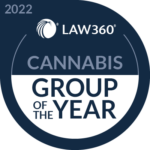As we previously reported, on October 6, 2022, President Biden announced that he would pardon those convicted of simple marijuana possession offenses under the federal Controlled Substances Act. As part of his executive action, Biden directed the Attorney General to develop an administrative process to issue Certificates of Pardon to eligible individuals.
On March 3, 2023, the Department of Justice announced the launch of an online application form for individuals seeking proof that they were pardoned under Biden’s proclamation. The form requires the applicant to provide their full name, contact information, date and place of birth, and citizenship status, followed by information about their charge or conviction with supporting documentation.
In order to be eligible for the Certificate of Pardon, applicants must satisfy the following:
-
- Applicant must have been charged with or convicted of simple marijuana possession by either a federal district court or D.C. Superior Court;
- Applicant must have been a U.S. citizen or lawfully present in the U.S. at the time of the offense; and
- Applicant must have been a U.S. citizen or lawful permanent resident on October 6, 2022, when Biden announced the pardon.
Note that the pardon neither indicates the innocence of the federal offender nor expunges their conviction. Nevertheless, it may remove civil restrictions such as the right to vote, hold office, or sit on a jury. The pardon may also alleviate limitations placed on obtaining certain licenses or employment.
However, Biden’s pardon merely affects several thousand federal offenders. As we previously reported, only about 6,500 people have been convicted for simple possession under federal law and a few thousand more have been convicted under the Code of the District of Columbia. The vast majority of cannabis convictions for simple possession occur at the state level. Those convicted of state marijuana offenses do not qualify for the pardon. Biden urged state governors to follow his lead and issue similar pardons.
Since Biden’s proclamation, several states have flirted with the idea of pardoning nonviolent marijuana crimes, some of which took more substantial steps forward. For example, on November 21, 2022, the governor of Oregon pardoned more than 47,000 people with convictions for simple marijuana possession and forgave more than $14 million in unpaid fines and fees.
As of the present, Connecticut, Missouri, Rhode Island, and Alaska have demonstrated similar relief efforts. Connecticut expunged the record of about 44,000 residents convicted of cannabis possession, while Missouri expunged the record of about 7,500 residents and ultimately expects 100,000 expungements in the coming months. The Chief Justice of the Rhode Island Supreme Court issued an executive order directing judges to establish and implement marijuana expungement procedures. Rhode Island expects 30,000 residents to be able to clear their record. Justices of the Alaska Supreme Court issued a similar order, permitting residents convicted of possessing less than one ounce of marijuana to seal the records related to such convictions. Alaska expects 800 residents to benefit from the order, which takes effect May 1, 2023.
To date, 24 states have enacted legislation to expunge marijuana-related criminal convictions. According to the National Organization for the Reform of Marijuana Laws, state and local officials have issued more than 100,000 pardons and more than 1.7 million marijuana-related expungements since 2018. More states are likely to follow in the same breadth soon.
Read the full text of the article on Law360.

